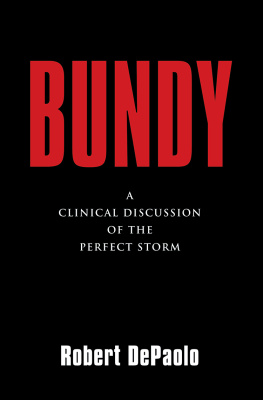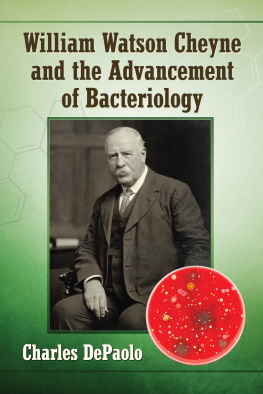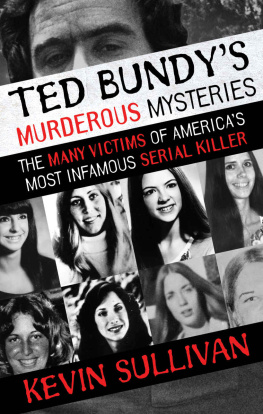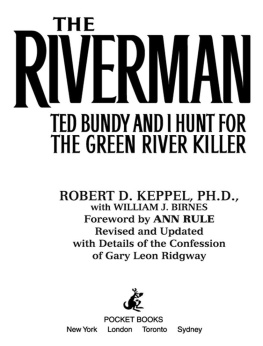Robert DePaolo - BUNDY
Here you can read online Robert DePaolo - BUNDY full text of the book (entire story) in english for free. Download pdf and epub, get meaning, cover and reviews about this ebook. year: 2020, genre: Religion. Description of the work, (preface) as well as reviews are available. Best literature library LitArk.com created for fans of good reading and offers a wide selection of genres:
Romance novel
Science fiction
Adventure
Detective
Science
History
Home and family
Prose
Art
Politics
Computer
Non-fiction
Religion
Business
Children
Humor
Choose a favorite category and find really read worthwhile books. Enjoy immersion in the world of imagination, feel the emotions of the characters or learn something new for yourself, make an fascinating discovery.
- Book:BUNDY
- Author:
- Genre:
- Year:2020
- Rating:5 / 5
- Favourites:Add to favourites
- Your mark:
- 100
- 1
- 2
- 3
- 4
- 5
BUNDY: summary, description and annotation
We offer to read an annotation, description, summary or preface (depends on what the author of the book "BUNDY" wrote himself). If you haven't found the necessary information about the book — write in the comments, we will try to find it.
BUNDY — read online for free the complete book (whole text) full work
Below is the text of the book, divided by pages. System saving the place of the last page read, allows you to conveniently read the book "BUNDY" online for free, without having to search again every time where you left off. Put a bookmark, and you can go to the page where you finished reading at any time.
Font size:
Interval:
Bookmark:


Copyright 2020 Robert DePaolo
Print ISBN: 978-1-64718-698-2
Epub ISBN: 978-1-64718-699-9
Mobi ISBN: 978-1-64718-700-2
All rights reserved. No part of this publication may be reproduced, stored in a retrieval system, or transmitted in any form or by any means, electronic, mechanical, recording or otherwise, without the prior written permission of the author.
Published by Abuzz Press, St. Petersburg, Florida.
Abuzz Press
2020
First Edition
Library of Congress Cataloging Data
DePaolo, Robert
BUNDY: A Clinical Discussion of The Perfect Storm by Robert DePaolo
Library of Congress Control Number: 2020942795
DISCLAIMER
This book details the authors clinical opinions about the life and psychological profile of Ted Bundy. The author did not conduct individual examinations with the subject but prior to retirement was as licensed practitioner in the field of clinical psychology.
The author and publisher are providing this book and its contents on an as is basis and make no representations or warranties of any kind with respect to this book or its contents. The author and publisher disclaim all such representations and warranties, including for example warranties of merchantability and financial advice for a particular purpose. In addition, the author and publisher do not represent or warrant that the information accessible via this book is complete or current.
The statements made about products and services have not been evaluated by the U.S. government. Please consult with your own Certified Public Accountant or financial services professional regarding the suggestions and recommendations made in this book.
Except as specifically stated in this book, neither the author or publisher, nor any authors, contributors, or other representatives will be liable for damages arising out of or in connection with the use of this book. This is a comprehensive limitation of liability that applies to all damages of any kind, including (without limitation) compensatory; direct, indirect or consequential damages; loss of data, income or profit; loss of or damage to property and claims of third parties.
You understand that this book is not intended as a substitute for opinions rendered by licensed clinicians who provided direct evaluations of Ted Bundy.
This book provides content related to topics pertaining to psychological theory as applied to the actions of Ted Bundy. As such, use of this book implies your acceptance of this disclaimer.
CONTENTS
Good and Evil
Human beings are one of natures evolutionary miracles. The almost ridiculous disproportion in size between our brain and body makes us highly intelligent and opens up all kinds of experiential possibilities (both good and bad). We are also somewhat paradoxical creatures, because while natural selection favored us with an extraordinarily large brain, that brain cannot explain its own operational mechanics. We know a fair amount about its structure, including sites that correlate with functions such as speech, emotion, fine motor control, sensation and balance. But we dont know very much about the interplay among those sites that give rise to mood, abstract thought and general intelligence. We dont know why we are able to think about the future - neither scientists nor philosophers can explain that, and we dont know why we can feel empathic connections to entities beyond the social- interactive domain.
That aspect of human nature separates us from the pack. Most primates, particularly our closest cousins the great apes, can feel sadness over the illness or death of a fellow group member, but humans take this to another level. We can conjure up sentimental feelings toward a car, a pair of shoes or a baseball bat. We might shed a tear driving down the road when a favorite oldie comes on the radio. Despite our relative ignorance of the neuro-mechanics behind this, perhaps because of it, we spend a great deal of time and energy trying to categorize what we dont understand.
That inability to truly know why we do what we do is only one confusing aspect of being human. Another is our insatiable thirst for a steady stream of new information. It is as if nature and/or God played a trick by giving us a brain so advanced that while it can engage in the discovery of things as minute as a quantum particle and as vast as a galaxy, it is unable to obtain permanent contentment in the aftermath of discovery. Put simply, we are a species rising and falling through time on a seesaw. We become uncomfortable with uncertainty so we seek resolution. Then, having found it, we discover closure is not a satisfying end point. That forces us to seek more uncertainty for purposes of finding closure again - and the life-long cycle continues. Through all this, we are forced to concede that there is more to us than is implied in the term Homo sapiens - the wise upright walker. It turns out we are not just wise men but intellectual perennials, both gifted and vexed by a relentless curiosity drive.
That is one reason we need to label, attribute and attach our perceptions and experiences to something else to give it credence and utility. We are the hyper-associative lords of the natural world, living by the maxim; a place for every experience and every experience in its place.
Sometimes our associations turn out to be accurate, interesting and even life saving, but they can also be inconsequential and even harmful. Hitler developed an ungodly, artificial association between white Aryans and superiority. Machiavelli associated the Prince with divinity. Reverend Jim Jones associated himself with God.
The same curiosity and need for closure exists in our interpretations of human behavior. Because we are so socially interdependent, so consumed with what motivates us, pleases us, fascinates us and causes us pain, we are relentless about finding out what makes us feel and act.
That interest is more fervent with regard to the most extreme examples of human behavior. That is because while behavioral norms provide comfort, behavioral deviations arouse our emotions as well as our curiosity. They force us to pay attention.
There is, however, a difference between curiosity and horror. We are used to human behavioral diversity We accept that there are conformists and non-conformists, realists and dreamers, optimists and pessimists. But there are parameters - a threshold beyond which social interest turns to incredulity.
One such threshold pertains to the question of why any human being would decide to kill another. Since it is hard for us to comprehend the motivation behind anothers heinous actions we often attribute them to some outside force. Thats where the quintessential human morality play comes into focus, and where the word evil enters the picture.
The word evil is, in many ways, its own conundrum. On one hand, it implies that a person is unresponsive to normal social mores and is virtually obligated to continue a pattern of anti-social behavior. After all, the word is derivative of the word devil. If Satan is pulling the strings, the actor possessed, there is really nothing anyone can do about it except isolate or kill the actor. That of course, removes all responsibility for the act. It renders obsolete, concepts like jurisprudence, self-determination and even the cherished notion of free will espoused in the Bible and all democratic governmental systems.
Ironically, the same is true of the word good. It is derived from the word God. In that sense it is also a non-deterministic concept. It assumes that an outside force is prompting all the good that we do, feel and think - that our most valued altruistic instincts are beyond our control and therefore meaningless as signs of character.
Font size:
Interval:
Bookmark:
Similar books «BUNDY»
Look at similar books to BUNDY. We have selected literature similar in name and meaning in the hope of providing readers with more options to find new, interesting, not yet read works.
Discussion, reviews of the book BUNDY and just readers' own opinions. Leave your comments, write what you think about the work, its meaning or the main characters. Specify what exactly you liked and what you didn't like, and why you think so.










